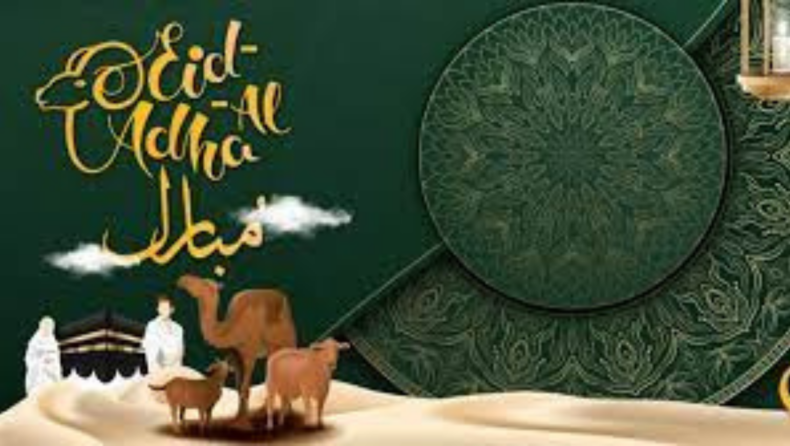Eid ul Adha, the second major festival after Eid ul Fitr, will be celebrated today by Muslims across the globe. In South Asia, it is also known as “Bakrid” referring to the sacrifice or qurbani of the goat that is done to mark the day. Eid ul Adha is celebrated on the third day of the Hajj pilgrimage. It falls on on the tenth day of the month of Dhul Hijjah in the Islamic lunar calendar.
Why is Bakrid or Eid ul Adha celebrated?
In Arabic, Eid ul Adha means the “feast of sacrifice”. It honours the intended sacrifice and devotion of Prophet Ibrahim to God’s command.
As per Islamic history, Bakrid or Eid ul Adha marks the piety of Prophet Ibrahim. He was commanded by God to sacrifice what he loved most, his son Ismail, to test his faith. Prophet Ibrahim then told his son of God’s command. His son readily agreed and asked to be sacrificed. Just as Prophet Ibrahim was moving to sacrifice his son, an angel appeared. He replaced Ismail with a goat and told Prophet Ibrahim that God was pleased with his devotion.

How is Eid ul Adha celebrated?
The day of Eid is announced based on the moon sighting. Muslims offer a special Eid namaz in the morning of Eid and attend a khutbah or sermon afterwards. They dress up in new clothes, women apply henna, and meet with family and friends.
Why is a goat sacrificed?
To commemorate Prophet Ibrahim’s sacrifice, a goat or sheep is slaughtered. Muslims buy an animal a few days prior and sacrifice it on one of the three days of Eid. The animal is divided into three parts: one reserved for personal use, one distributed amongst family and friends, and one given away to charity.
What do animal rights activists have to say about it?
Bakrid is a time when most Muslims face criticism or invasive questioning regarding the practice of sacrificing an animal. Without proper knowledge, most people assume it is a barbaric or unnecessary practice. Upon further research, this assumption proves to be quite inaccurate.
Islamic law concerning the sacrifice is very clear on the need to be compassionate and respectful towards the sacrificial animal. It must be fed well, raised in an open space where it is free to move, and must not be harmed or hurt in any way before sacrificing. In fact, it is also prohibited to show the animal the knife or talk about slaughter in its presence. The animal is then slaughtered by hand across the jugular vein, to make it as painless as possible for the animal. This method of slaughtering in the Islamic manner is known as Zabiha. Only an animal slaughtered through the practice of Zabiha is halal, or permissible to eat, for Muslims.
How is zabiha different from commercial slaughter practices?
The main different between commercial slaughter practices and Zabiha is the way the animal is treated before slaughter. Commercial slaughterhouses often use factory farming practices whereas Zabiha animals are hand-raised by small farmers.
Factory farming is an invasive agriculture practice that is meant to maximise meat production while minimising costs. This means keeping the animal confined in cramped, lightless, and unhygienic spaces solely for the purpose of slaughter. Animals are often underfed or dangerously overfed, given hormones to speed up ageing, and generally kept in a bad shape. Factory farms are usually run by large corporations who are only interested in profiteering. Animal welfare is barely given a thought in these places. The animals are then stunned and killed on mass production lines. Factory farms are year-long processes under which billions of animals are slaughtered every year in India alone.
On the other hand, Zabiha is usually done by small time farmers and butchers whose main source of income comes from animal husbandry. The animals are usually raised on small farms by hand, and first used for their milk and as farm support before being slaughtered.
What are some problems faced by Indian Zabiha farmers in recent days?
Given the current political scenario, the situation for goat farmers and butchers has worsened in recent years. “We are often harassed by the police, especially during Eid time. There is excessive checking and often product is forcibly taken. We deal only in mutton and chicken, but are often accused of carrying beef and harassed because of it,” a goat farmer from Amethi district, Uttar Pradesh, revealed in an interview with the journalist.
“This is just what the officials do. Then there is also the fear of mob lynching from hate groups. They are always extra active during Eid time,” another goat farmer added. Mob lynching on accusations of carrying beef have increased multifold in recent years, especially in Uttar Pradesh.
The political scenario has made the business of Zabiha a precarious one for farmers. They are struggling to keep their businesses afloat. Despite the issues, farmers happily look forward to the next Eid, praying for better days and better profits.













